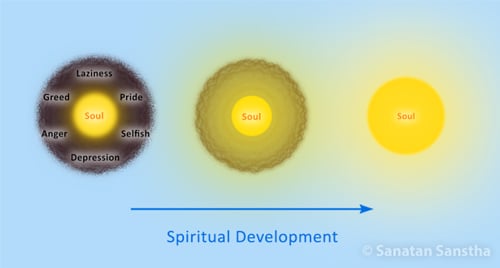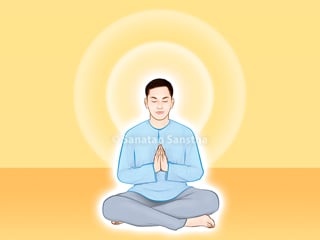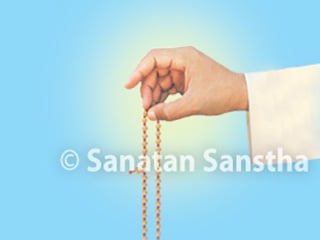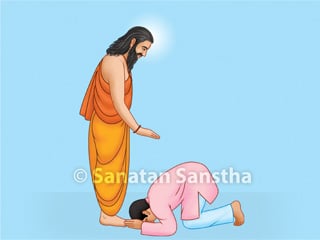
The true goal of human life is God-realisation. Efforts made to imbibe Divine virtues in the self for individual spiritual growth is termed vyashti sadhana (Individual spiritual practice). While making efforts to imbibe virtues as per the present times, it is not enough to be satisfied with self endeavours. In Kaliyug (Era of strife) the proportion of sattvikta (Sattva-predominance; Purity) in the society has declined to a great extent, and hence, to increase the sattvikta of the society, it is necessary to get sadhana (Spiritual practice) performed by the society. This is termed samashti sadhana of those who make such efforts. Performing appropriate sadhana brings about spiritual growth. Information on the various stages of spiritual growth and ways to achieve it has been provided in this article.
1. Seeker should imbibe God’s Shakti (Divine
Energy) by enhancing his will and bhav (Spiritual emotion)
An individual should increase its ichha-shakti (Energy of will). When the ichha-shakti increases, it can imbibe various Shaktis from the surrounding environment. It is said – ‘God showers us with plenty, but we lack in our efforts to imbibe it’. To prevent black energy from entering the body, an individual should also enhance its bhav. This means that with ichha-shakti, if we also enhance our bhav, God will certainly come into our life.
2. Do seva to make rapid spiritual growth
God loves an individual that does seva; because, through the medium of seva, the individual worships God simultaneously at all the three levels (of body, mind and wealth). Through no other form of worship can seeker worship simultaneously at three levels. Hence, a seeker performing seva sincerely makes rapid spiritual growth.
3. Importance of spiritual progress
A. To be able to tolerate the Shakti emanating from God for destruction of evildoers during the adverse times, spiritual progress is essential : Adverse times will soon commence. Many among you (seekers) do not have the strength of sadhana to tolerate the harmful effects of the adverse times. This Era of calamity is a period of destruction of evildoers at the gross level. Just as Shriram ensured that the monkeys progress spiritually before the onset of the battle (meaning, before the adverse time) in Ramayan. It was impossible for the monkeys to fight terrible demons like Ravan. At the time of war, Shriram was to impart Shakti to them. However, to be able to tolerate that Shakti, it was necessary for them to progress spiritually. Hence, He got the seva of constructing the setu (Bridge) on the sea performed through them while they chanted. (Sadhana of that Era was ‘meditation’; however, it was not possible for the monkeys to meditate. Therefore, Shriram made them perform the sadhana of chanting.) To be able to tolerate that Shakti, progress spiritually. Due to Shriram’s resolve and the seva performed by the monkeys, they were able to fight in the battle. Only Deity Hanuman from His army was not required to perform any sadhana. Yet, He performed the seva. Therefore, O seekers ! Wake up now and obey the Guru’s orders. Remember, it will be impossible for anyone to perform sadhana during the adverse times; perform sadhana now.
B. In order to attain an evolved spiritual state, one will receive help at the appropriate moment if yearning is increased, and the spiritual state attained will be proportional to one’s level of obedience : To attain a spiritual state higher than the present state,an individual should increase his yearning. God helps and guides at the appropriate time in some form or the other. Do everything as per His guidance. The spiritual state attained by a seeker is proportional to his level of obedience
4. Stages in spiritual progress
A. Efforts required to advance towards the next ideal stage
-
Making 100% efforts (For eliminating personality defects and ego) to achieve the status of a seeker.
-
Keeping the body, mind and intellect engrossed in seva unto the Guru and God
-
Developing 100% Priti (Unconditional love) in yourself and also developing Priti about yourself in others.
-
Remaining constantly in the thought that ‘we are moving towards ideal behaviour’.
-
Acquiring subtle-knowledge.
-
Making efforts to develop superior (100%) level of devotion.
-
Earning the grace of the Guru every moment.
-
Performing every activity enriched with Divine virtues to 100% perfection.
-
Making efforts to turn every individual in the society into a seeker.
Only an individual that makes the aforementioned efforts will become ideal by advancing to the next ideal stage.
B. Effect of sadhana on the trigun
-
Attitude of an individual depends on the predominance of the Panchamahabhutas (Five Cosmic Elements) and trigun in prakruti (Primeval nature), and karma takes place as per the attitude.
-
Based on karmas in the previous births (Prarabdha and sanchit) and sanskars (Subconscious impression) imbibed in this birth, the attitude becomes tamasik (Tama-predominant) or sattvik (Sattva-predominant).
-
Tamasik karma takes us away from God, while sattvik karma takes us close to Him.
-
If efforts for purification of the subconscious mind are made by performing sadhana, transformation in the prakruti and trigun is possible.
-
If an individual performs sadhana of the next varna (Class) in this birth itself and progresses spiritually, it can transcend the trigun.
-
Since the motive and action are based on the predominance of trigun, the individual can get liberated from the bondage of karma and its fruits.
-
Journey from a Tama-predominant attitude to a Sattva-predominant attitude means the journey from the state of a Shudra to that of Sainthood.
-
An individual whose attitude is Tama-predominant and does not perform sadhana is termed a demon; whereas, a pure individual performing sadhana with sattvik attitude, meaning, that which belongs to Hansavarna (Those Liberated) is termed a form of God.
C. Journey from purification of the chitta (Subconscious mind) to the nirgun (Non-materialised)
i. Necessity of creating Chaitanya (Divine consciousness) in the self :
-
When our speech and action are enriched with Chaitanya, people around are positively influenced.
-
We feel that others should listen to us. For that to happen, we should have Chaitanya. Others are influenced by our intellect to the extent of 30%, by love to the extent of 10% and by Chaitanya to the extent of 60%.
-
In the adverse times, Chaitanya keeps negative energies away.
-
Deities are attracted towards Chaitanya.
ii. Having a bhav that ‘we should imbibe Chaitanya present in every animate and inanimate objects’ is true Hindu Dharma and real sadhana : To imbibe Chaitanya from every animate and inanimate object on the strength of our devotion is true Hindu Dharma. While performing each karma, only if an individual has a bhav that, ‘I have to imbibe Chaitanya through this karma’, its birth as a human being will be fruitful and it will make rapid spiritual growth.
iii. Due to sadhana, deep rooted personality defects in the attitude over many previous births get eliminated and this purifies the subconscious mind.
iv. Being able to remain in Chaitanya : Wherever Gurutattva (Guru Principle) is active, Chaitanya is easily emitted there. Hence, by benefit from it, it becomes possible to spend every moment in Chaitanya.
v. Upon obeying the Guru’s sagun (Materialised) form, by having a bhav that He is the Guru Principle, it is possible to move towards the nirgun Principle.
vi. Achieving expansiveness : As a result of perceiving the Guru Principle in every animate and inanimate object, we feel love for everyone and can reach the stage of Priti. The next stage is to become one with the nature by generating a bhav that ‘The entire nature is mine’.
vii. A pure and clear antahakaran helps in God-realisation in a shorter period : ‘God-realisation’ is the objective of a seeker. God-realisation means experiencing divinity every moment. A fraction of God (meaning the soul) dwells in every being; however, to be able to experience it (that is, to experience constant Anand [Bliss]), it is essential to have a pure and clear antahakaran. When no sanskar remain in the seeker, his antahakaran becomes pure. It is with this intention of purifying the antahakaran, that a seeker should make sincere efforts to eliminate his personality defects. Only if the antahakaran is pure and clear, the seeker will be able to merge in a short period with God, who is the most pure and clear. Antahakaran of Saints and infants is extremely pure. Hence, they are able to remain in constant communion with God and can experience a constant state of Anand.
-
Acts to keep the antahakaran pure :
-
Note the mistakes honestly in the personality defects table everyday and honestly narrate your mistakes and defects to others.
-
While narrating your own mistakes to other seekers, be honest in accepting such mistakes. This will help reduce the proportion of black covering on the corresponding defects in the subconscious mind and the proportion of Raja-Tama in the defect.
-
You should do atma-nivedan with your Deity of worship and confess all your mistakes. Amongst all forms of devotion, atma-nivedan is the best.
-
-
Benefits of purifying the antahakaran :
-
If a seeker confesses his mistakes honestly and takes remedial measures to overcome them, these defects reduce with the grace of the Guru in a short period.
-
The Guru is pleased with the seeker quickly.
-
Development of Divine qualities in the seeker is faster.
-
Honesty develops frankness and innocence in a seeker.
-
It helps in obtaining spiritual benefits of the acts at the psychological level
-
viii. ‘Extroversion that enhances introversion’ is itself advait (Non-duality) : A day or a moment certainly comes in the life of every individual that makes efforts to progress spiritually, when due to the constant grace of the Guru it breaks free from all personality defects and sanskars, and has a spiritual experience that ‘every constituent of the universe and I are one’. When extroversion causes the individual to become introvert, the experience thereafter is itself an experience of advait.
5. Proportion of spiritual progress
Dissolution of the body, mind, subconscious mind, intellect, ego and the spiritual level of a seeker :
| Dissolution of what ? | At what spiritual level can a seeker achieve this? |
|---|---|
| Body (Body-awareness) | 50 |
| Mind | 60 |
| Intellect | 70 |
| Ego | 80 |
| Chitta | At the time of attaining Moksha (Final Liberation) |
Reference : Sanatan’s Sanstha Holy text ‘Virtues essential for Samashti Sadhana’.


 Which is the simplest spiritual practice in Kaliyug?
Which is the simplest spiritual practice in Kaliyug? Karma-yoga
Karma-yoga Spiritual Practice
Spiritual Practice The Guru and Shishya (Disciple)
The Guru and Shishya (Disciple)